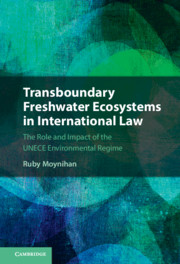 Transboundary Freshwater Ecosystems in International Law
Transboundary Freshwater Ecosystems in International Law Published online by Cambridge University Press: 01 October 2021
This chapter outlines the significance and urgency of the current global water crisis and demonstrates that the existing international legal architecture for transboundary freshwater ecosystems requires significant improvement to meet current and predicted transboundary water challenges, resolve conflict and strengthen cooperation. The chapter sets out the three overarching objectives of the book. First, to understand the rising impact of regional approaches to international law on transboundary freshwater ecosystems. This includes identifying the contribution of the UNECE Water Convention and other relevant UNECE environmental instruments as a coherent legal regime. Second, to provide a more coherent understanding of the relationship between the UNECE environmental regime, international water law, international environmental law and general international law. This includes examining the contribution of the UNECE regime to cornerstone rules and principles of international water law and emerging or missing concepts such an ecosystem approach or public participation. Third, to understand how the UNECE regime adds to or interacts (on a normative and an institutional level) with river basin agreements, river basin commissions, European Union water law and national law. The introduction highlights the timely nature of the enquiry against the contemporary context and frames the book’s place against existing writing on this subject.
To save this book to your Kindle, first ensure [email protected] is added to your Approved Personal Document E-mail List under your Personal Document Settings on the Manage Your Content and Devices page of your Amazon account. Then enter the ‘name’ part of your Kindle email address below. Find out more about saving to your Kindle.
Note you can select to save to either the @free.kindle.com or @kindle.com variations. ‘@free.kindle.com’ emails are free but can only be saved to your device when it is connected to wi-fi. ‘@kindle.com’ emails can be delivered even when you are not connected to wi-fi, but note that service fees apply.
Find out more about the Kindle Personal Document Service.
To save content items to your account, please confirm that you agree to abide by our usage policies. If this is the first time you use this feature, you will be asked to authorise Cambridge Core to connect with your account. Find out more about saving content to Dropbox.
To save content items to your account, please confirm that you agree to abide by our usage policies. If this is the first time you use this feature, you will be asked to authorise Cambridge Core to connect with your account. Find out more about saving content to Google Drive.